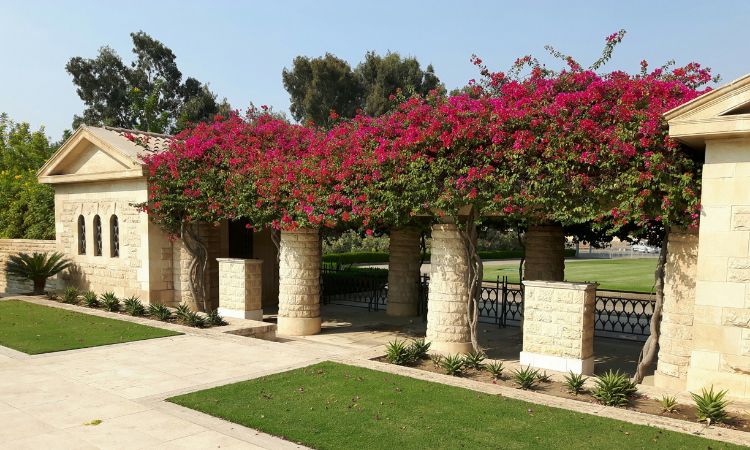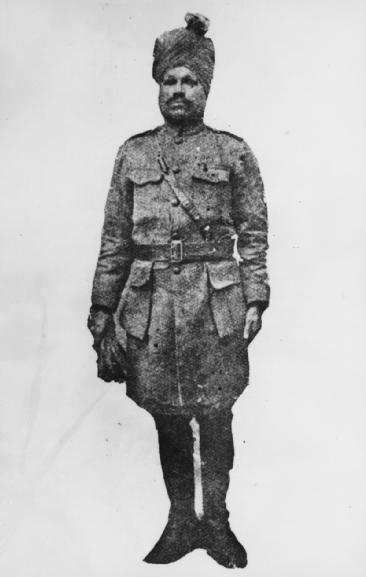21 September 2018
Haryana First World War hero remembered

The Commonwealth War Graves Commission is marking the end of the First World War Centenary with 120 personal stories of those who made the ultimate sacrifice in the last months of the war. One remarkable story is that of Risaldar Badlu Singh, from Dhakla Haryana, who died on 23 September 1918. The CWGC commemorates nearly 74,000 members of Indian forces who served in the First World War.
To mark the end of the First World War Centenary, the Commonwealth War Graves Commission (CWGC) has launched its “Road to Peace” project. The project tells 120 personal stories of casualties who died during the final 100 days of the First World War, from 8 August to 11 November.
The stories have been compiled by the CWCG’s team of historians and includes the remarkable account of Risaldar Badlu Singh, an Indian First World War hero, who was posthumously awarded the Victoria Cross, for remarkable bravery in the War.
Badlu was born in the village of Dhakla, in the district of Rohtak (now Jhajjar), Haryana, in 1876. He was an Officer in the Indian Army, and before the outbreak of the War he served with the 14th Murray's Jat Lancers Regiment, a cavalry regiment of the British Indian Army. During the war, Badlu joined the 29th Deccan Horse Lancers, and was sent to France in 1914. In March 1918, Badlu and his regiment were posted to the Middle East, where Allied troops were fighting the forces of the Ottoman Empire.

In September 1918, British Empire forces in Palestine renewed their offensive against the Ottomans. On 23 September Badlu’s squadron were advancing on enemy positions near the River Jordan when they came under heavy enemy fire. Badlu led a charge which captured the enemy position but was fatally wounded in the attempt.
For his actions, Badlu was posthumously awarded a Victoria Cross.
His citation in the London Gazette in 1918 describes his actions:
“For most conspicuous bravery and self-sacrifice on the morning of the 23rd September 1918, when his squadron charged a strong enemy position on the west bank of the River Jordan, between the river and Kh.es Samariveh Village.
On nearing the position Ressaidar Badlu Singh realised that the squadron was suffering casualties from a small hill on the left front occupied by machine guns and 200 enemy infantry. Without the slightest hesitation he collected six other ranks and with the greatest dash and an entire disregard of danger charged and captured the position, thereby saving very heavy casualties to the squadron. He was mortally wounded on the very top of the hill when capturing one of the machine guns single-handed, but all the machine guns and infantry had surrendered to him before he died. His valor and initiative were of the highest order.” — London Gazette, 27 November 1918
Badlu Singh was one of 11 Indian and Gurkha servicemen, who were awarded the Victoria Cross - Britain’s highest award for bravery during the First World War. Nearly 1.4 million men served with the Indian Army during the First World War of whom nearly 74,000 died and are commemorated by CWGC. However, India’s part in the war is frequently overlooked. The Road to Peace Project aims to illustrate the global nature of sacrifice of the First World War. Badlu is commemorated by the CWGC on the Helopolis (Port Tewfik) Memorial.
From famous casualties like the war poet Wilfred Owen, through to relatively unknown individuals; from those dying in battle to those who died of Spanish Flu; each story has been carefully chosen to shine a light on the human stories on the costly Road to Peace.
CWGC Historian, Max Dutton, explained: “Behind every one of our headstones or names on a memorial to the missing, is a human story just waiting to be told. Our 100 days ‘Road to Peace’ campaign will remind people of the human cost of the Great War, the sheer diversity of those who took part and the global nature of that sacrifice and remembrance today.
We hope that this story will inspire people to find out more about Badlu and his comrades commemorated by the CWGC and visit their graves and memorials”
The Road to Peace campaign started on 8 August – the 100th anniversary of the Allied victory at the Battle of Amiens – and will conclude on 11 November with the stories of 11 people who died on the very last day of the First World War, even as the guns fell silent. The “100 Days” is a term applied to the final period of the First World War, during which the Allies launched a series of offensives on the Western Front that ultimately led to peace. Not actually 100 calendar days, the term is a reference to the final period of the Napoleonic Wars.
The Road to Peace stories will be shared across the CWGC’s digital channels on Facebook, Twitter and Instagram Follow us using @CWGC and the hashtag #RoadtoPeace or add your own stories of those who died during this period using the hashtag. A story will appear every day – with a more in-depth feature appearing weekly.

